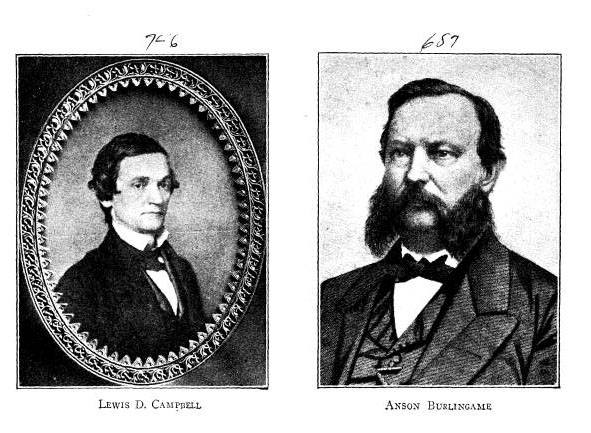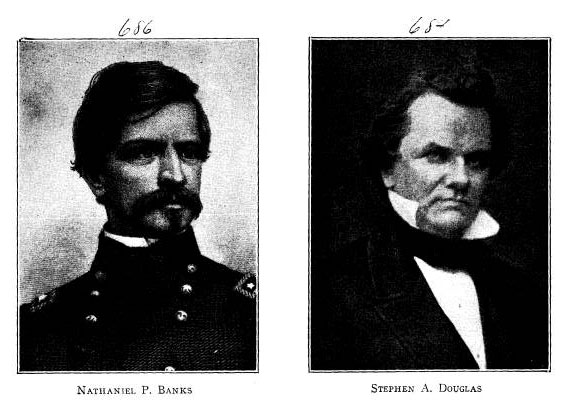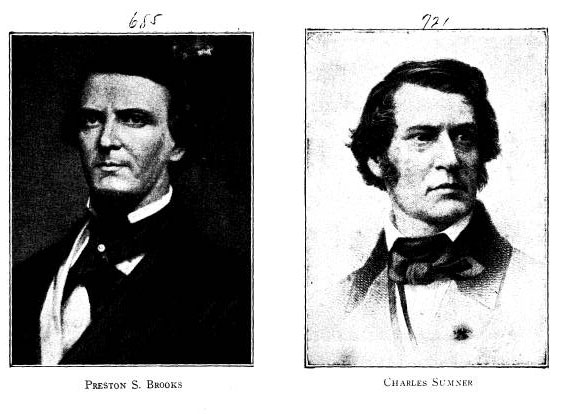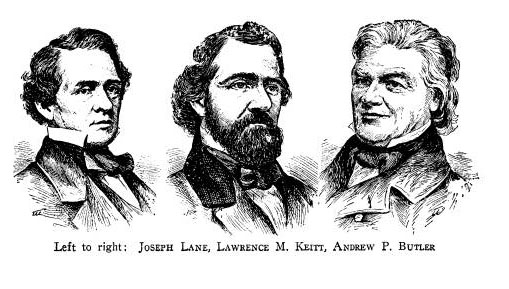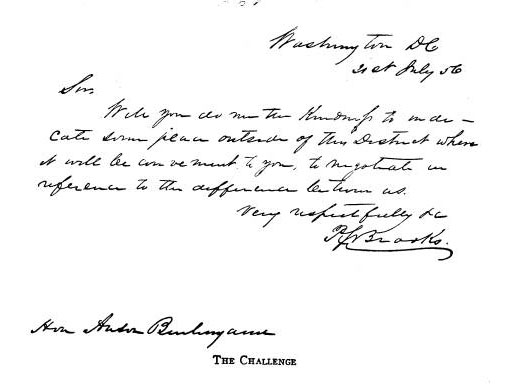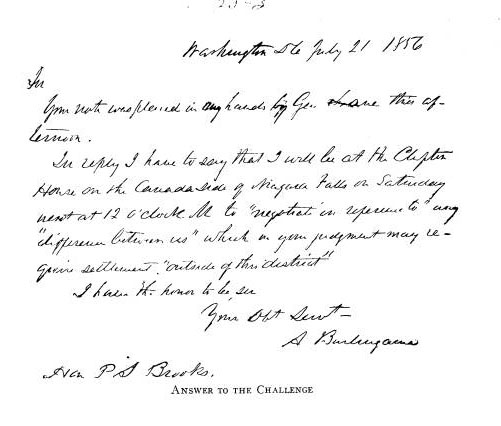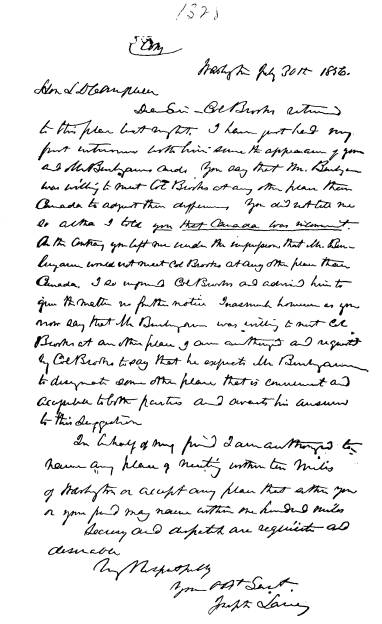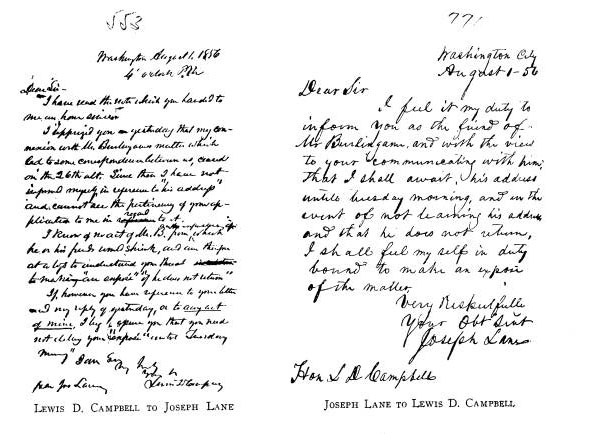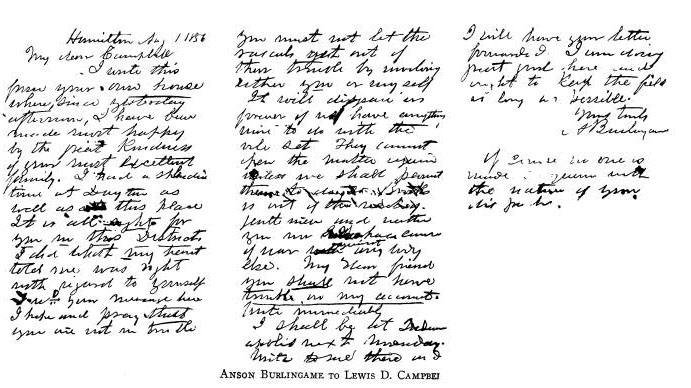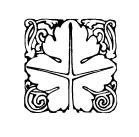Ohio History Journal
SUMNER -- BROOKS -- BURLINGAME
--or--
THE LAST OF THE GREAT CHALLENGES
BY JAMES E. CAMPBELL
The purpose of this paper is to throw
light upon one
of the most famous of the many
thrilling episodes which
preceded the Civil War -- thereby
reversing some ac-
cepted history; to mark the finish of
the long congres-
sional quarrel between Massachusetts
and South Caro-
lina; and incidentally, to note the
collapse of the
"Duello."
When the thirty-fourth Congress met, on
the third
day of December, eighteen hundred and
fifty-five, it
registered the initial appearance of a
political party de-
voted to the territorial restriction of
slavery. The
House of Representatives was a chaotic
jumble of di-
verse elements which had been elected
more than a year
before as Whigs, Anti-Slavery Whigs,
Liberty Whigs,
Democrats, Anti-Slavery Democrats,
Coalition Demo-
crats, States-Rights Democrats,
Republicans, American
Republicans, Union Republicans,
Anti-Nebraska men,
Free-Soilers, Union men and Americans.
The Ameri-
cans were commonly called Know-Nothings
and, at the
time of their election constituted the
largest party. Since
the election, in 1854, a majority of
the Anti-Slavery
members had taken part in nationally
organizing the
Republican party to which they had
transferred their
allegiance. Rhodes, in his History of
the United States,
says that
(435)
436 Ohio Arch. and Hist. Society Publications
The Congressional Globe, which
was accustomed to indicate
the partisan divisions by printing the
names of the members in
different type, now gave up the
classification in despair.
Woodrow Wilson, in his History of
the American
People, says:
What with Anti-Nebraska men and
Free-Soilers, Democrats.
Southern Pro-Slavery Whigs and
Know-Nothings, the House of
Representatives presented an almost
hopeless mixture and con-
fusion of party names and purposes.
The election of a Speaker was the first
thing in order.
With the exception of the regular
Democrats, it is un-
certain whether any of the numerous
parties was suffi-
ciently well organized to hold a
nominating caucus.
Henry Wilson, afterwards
Vice-President, in his Rise
and Fall of the Slave Power, says that
Richardson was the caucus nominee of the
democrats. * * *
The opposition scattered their votes
which, on the first calling
of the roll, were distributed among no
less than twenty candi-
dates. Campbell of Ohio received the
largest number. On the
sixth of December he withdrew his name.
Mr. Campbell had led on six ballots,
and gave as his
reason for withdrawal that he could not
be elected with-
out repudiating his well-known
principles on the subject
of slavery. He transferred his
following to N. P. Banks
of Massachusetts who had been elected
as a Coalition
Democrat and an American in a strong
anti-slavery dis-
trict, but who was now a Republican.
After that the
contest ran on until the sixth day of
February with Mr.
Banks in the lead. There being no
possibility that any
candidate could get a majority, an
agreement was made
that on the one hundred and
thirty-third ballot, a plural-
ity should nominate. Upon that ballot
Mr. Banks received
438
Ohio Arch. and Hist. Society Publications
one hundred and three votes out of a
total of two hun-
dred and fourteen. In the meantime the
President's
message was withheld, the Senate had
been wholly idle
for two months and much of the public
business was at
a standstill.
Thus, after a contest, unequalled for
duration and
acrimony in national politics, the
various anti-slavery
elements were successfully combined
into a heterogene-
ous coalition which elected the Speaker
by a minority
vote. Such a complete break-up and
re-alignment of
political parties has no parallel in
history, and could
have resulted only from the acute
crisis arising over the
passage of the Kansas-Nebraska bill,
the fugitive slave
act, the repeal of the Missouri
compromise and the at-
tempted extension of slavery.
The people of the North, as a general
thing, acqui-
esced in the constitutional protection
of slavery in the
southern states, although sometimes
they were locally
riotous when fugitive slaves were
arrested in their
midst. The slaveholders, however, had
begun to claim
the right of owning and holding slaves
in the territories
-- especially the Territory of Kansas.
When it was
sought to further extend the actual
domain of slavery,
a moral question came into politics and
immediately
overshadowed all other issues.
The people of the South, conscious that
the death of
their "Peculiar Institution"
would be the ultimate result
of its territorial limitation, met this
paramount issue
with a heat born of desperation. In the
North, it was
a case of quickened conscience; in the
South, a case
largely of apprehended financial ruin,
but, also, to some
extent, it was an honest belief in the
beneficence of Afri-
440 Ohio Arch. and Hist. Society Publications
can slavery, for the Richmond
Enquirer, the organ of
the simon-pure protagonists of slavery,
had laid down
the doctrine that
If slavery be not a legitimate, useful,
moral and expedient
institution, we cannot, without reproof
of conscience and blush
of shame, seek to extend it.
For almost two years a brisk guerrilla
warfare, entail-
ing much loss of life and property, had
been waged in
the disputed territory of Kansas --
known to this day
as "Bleeding Kansas." Both
sections of the country
were contributing men, money and the
famous "Sharp's
Rifles" to this conflict, of which
the most conspicuous
figure was that of "Old John Brown
of Osawatomie."
In the Senate, Seward of New York had
said that
Two candidates, each claiming to have
been elected to repre-
sent that territory in Congress, had
presented themselves at the
bar of the House. One had received some
three thousand votes
cast by the Missouri invaders, when
there were not fifteen hun-
dred voters in the territory.
Mr. Giddings wrote, later, that
These high-handed transactions were
consummated with
the express purpose of establishing
African slavery by force, in
violation of the rights of the people
solemnly guaranteed to them
by the Congress of the United States.
In the slave states, especially in
South Carolina,
threats of secession were freely and
publicly proclaimed;
and, in the North, there were
abolitionists who, by
speech and in print, denounced the
Federal Constitution
as a "Covenant with Hell."
Henry Wilson says that
Unfortunately the evidence is far too
conclusive to leave any
doubt as to the anarchical sentiment
that prevailed too generally
at the South and far too largely,
indeed, at the North.
Sumner -- Brooks -- Burlingame 441
As to the situation at that time in
Washington he
adds that
To the extreme arrogance of embittered
and aggressive words
were added the menace and actual
infliction of personal violence.
* * * Members of congress went armed in
the streets and sat
with loaded revolvers in their desks.
These preliminary facts are recited in
order that the
present generation may approximately
realize the fierce
sectional and political rancor which
preceded the Civil
War; for, while the cost of that
struggle may be stated
in blood and treasure, the bitter
animosities of which it
was the culmination are almost
incapable of adequate
portrayal.
One of the senators from Massachusetts
was Charles
Sumner, then in the prime of life, who,
although elected
to the Senate by a combination of
Democrats and Free-
Soilers, was now a member of the
recently organized
Republican party. His leonine head and
strong face
bespoke the ability and courage with
which he had been
amply endowed by his Puritan ancestors.
His polished
oratory, erudite scholarship and
unsympathetic tempera-
ment had united to develop an
inordinate egotism; and,
in his own estimation, the senatorial
mantle of Daniel
Webster (which had descended upon him)
was none too
large. He valued himself so highly that
he failed to
recognize the merit of his opponents;
and his manner
of speaking was often distinctly
offensive. In order
properly to understand the events
hereinafter described,
the following symposium of opinions in
regard to Mr.
Sumner is submitted. Representative E.
R. Hoar of
Massachusetts, later Attorney General
of the United
States, spoke of
442 Ohio Arch. and Hist. Society Publications
His commanding presence, his stalwart
frame six feet and
four inches in height, the vigor and
grace of his motions, the
charm of his manners, the polish of his
rhetoric, the abundance
of his learning, the fervor and
impressiveness of his oratory.
* * * He never seems to have known fear.
* * * He
was of an imperious nature, intolerant
of differences of opinion
by his associates, and has been called
an egotist.
Senator George F. Hoar of Massachusetts,
says:
In him the egotism, often fostered by a
long senatorial career,
seems to have been natural. * *
* He could not understand
the state of mind of a man who could not
see as he did. * * *
It seems as if he thought the rebellion
itself was put down by
speeches in the senate, and that the war
was an unfortunate and
most annoying though trifling
disturbance -- as if a fire engine
had passed by.
Rhodes, the historian, says:
He was vain, conceited, fond of flattery
and overbearing in
manner.
But he also truthfully adds that he was
"the soul of
honor."
Charles Francis Adams wrote that
Sumner was a tremendous egotist, and
woefully lacking in
common sense.
Senator Morrill, of Vermont, said that
To his conclusions, sincerely reached,
he gave regal preten-
sions, and for them accepted nothing
less than unconditional sub-
mission.
General Grant, who never wasted words,
when told
that Sumner had no faith in the Bible,
replied, "That is
because he didn't write it."
John Sherman expressed the opinion of
Sumner that
Sumner -- Brooks -- Burlingame 443
The central idea of his political life
was hostility to slavery.
His hatred of slavery was fierce,
intense and morbid -- evinced
by such language of bitterness and
denunciation that no wonder
the holders of slaves construed his
invectives against the system
as personal insults demanding
resentment.
In spite of his vindictive hatred of
slavery, Senator
Sumner had no animosity toward the
Southern people.
After the war he moved that there be
stricken from the
regimental flags of our army the names
of all battles
fought against our countrymen. For this
a "bloody
shirt" legislature in
Massachusetts censured him; but,
later, stricken with proper shame at
such unpatriotic
action, it expunged the resolution of
censure.
Andrew Pickens Butler was a senator
from South
Carolina, elected as a States-Rights
Democrat, sixty-
two years of age, trembling with
partial paralysis, of
convivial habits and habitually
referred to in the South-
ern press as the "aged relative of
Mr. Brooks." Rhodes
says that
He was a man of fine family, older in
looks than his sixty
years, courteous, a lover of learning
and a jurist of reputation.
Giddings says
He was usually of gentle demeanor but
quite impatient of
opposition to questions touching
slavery. Whenever that institu-
tion came under debate, he assumed a
dictatorial tone, spoke dis-
respectfully of his opponents and, on
matters relating to Kansas,
he became offensive.
Von Hoist's Constitutional History describes
him as
South Carolina's pompous senator who
believed himself to be
made of different clay from ordinary
mortals.
Over seven years before, he was a
guest-of-honor at a
dinner where such toasts as
"Slavery" and "A Southern
Confederacy" were enthusiastically applauded. Al-
444 Ohio Arch. and Hist. Society Publications
though he had achieved some distinction
in his ten years
in the senate, yet he had cut but a
small figure in com-
parison with his eminent predecessors
Calhoun, Hayne
and McDuffie.
Preston S. Brooks was a young
representative from
South Carolina of attractive appearance
and mediocre
ability. He sprang from one of the best
families; was
well educated; and had served three
years in Congress
where his conduct was always that of a
gentleman. In
Pierce's Life of Sumner, he is
described as
A modest and orderly member, indulging
in no acrimonious
speech and keeping aloof from scenes of
disorder. His pacific
manner and temperament had been
observed.
Mr. Burlingame, whom he challenged
later, said of
him in a newspaper card
From what I had heard and seen of him
prior to his assault
upon Mr. Sumner, I had formed a high
opinion of him.
Mr. Brooks also called himself a
"States-Rights
Democrat." Upon his only published likeness were
printed the words "Equal Rights to
the South as well as
to the North." The delusion that the South was im-
posed upon wholly dominated him. In a
speech in the
campaign following the occurrences
hereinafter nar-
rated, he said that
The election of Fremont should be the
signal for the South
to march at once to Washington, seize the treasury and
archives,
and force the North to attack them.
* *
* It is just to tear
the constitution of the United States,
trample it under foot and
form a Southern Confederacy. I have been
a disunionist from
the time I could think.
He had served with credit in the
Mexican War as a
Captain in the Palmetto Regiment; and,
later, had
446
Ohio Arch. and Hist. Society Publications
fought a duel with a man named Wigfall.
So little did
he harbor resentment that later he
appointed Wigfall's
nephew as a cadet at West Point.
Lawrence M. Keitt was also a member of
the House
from South Carolina, and of that
distinct and high-
strung type then known as a
"Southern Fire-Eater."
By that phrase was meant a man whose
heart and soul
were wrapped up in the South and
particularly in the
institution of Slavery; who was
"game" to the core;
always set on a hair trigger; ready to
resent a real or
fancied insult to his state or section;
and a devotee of
the "Code Duello."
Interest attaches to the foregoing
incomplete sketches
of Sumner, Butler, Brooks and Keitt,
not only for what
follows hereafter, but because of the
antagonism that
had existed between Massachusetts and
South Carolina
since the Revolutionary War, and which
had repeatedly
broken out in Congress -- the most
prominent incident
of which had been the celebrated debate
between Web-
ster and Hayne.
Before going to Washington at this
session, Senator
Sumner said to his friend, Higginson,
"This session will
not pass without the Senate Chamber
becoming a scene
of some unparalleled outrage." On
the nineteenth and
twentieth of May, after having written
Theodore Par-
ker, "I shall pronounce the most
thorough philippic ever
uttered in a legislative body," he
delivered the most
powerful and vindictive of his many
great orations.
"The Crime Against Kansas"
was the stinging phrase
with which he scored the bloody deeds
enacted in the
attempt to foist slavery upon that
unhappy territory.
He truthfully denounced the Missourians
who had in-
Sumner -- Brooks -- Burlingame 447
vaded Kansas and who were known to the
world by the
opprobrious name of "Border
Ruffians." He stigma-
tized them as
Murderous robbers and hirelings picked
from the drunken
spew and vomit of an uneasy
civilization, lashed together by
secret lodges and renewing the
incredible atrocities of the As-
sassins and the Thugs.
On the State of South Carolina he made
this vitriolic
assault:
Has Senator Butler read the history of
the state which he
represents? He cannot surely have
forgotten its shameful imbe-
cility from slavery, confessed
throughout the Revolution, fol-
lowed by its more shameful assumptions
for slavery since. He
cannot have forgotten its wretched
existence in the slave trade as
the very apple of its eye, and the
condition of its participation in
the Union. * * * Were the whole
history of South Caro-
lina blotted out of existence, from its
very beginning down to the
day of the last election of the senator
to his present seat upon
this floor, civilization might lose -- I
do not say how little; but
surely less than it has already gained
by the example of Kansas
in its valiant struggle against
oppression. Ah, sir, I tell the
Senator that Kansas, welcomed as a Free
State, will be a min-
istering angel to the Republic when
South Carolina, in the cloak
of darkness which she hugs, lies
howling.
It was not reasonable to expect that
the South Caro-
linians should rest quietly under such
a bitter aspersion
of their native state.
Sumner's crushing invectives were also
hurled with
open scorn at the senators whom he
deemed to be the
defenders of the lawless invasions of
Kansas; and he es-
pecially pilloried Senator Butler and
Senator Stephen
A. Douglas, of Illinois, stating that
"as the Senator
from South Carolina is the Don Quixote
of slavery, the
Senator from Illinois is the squire of
slavery, its very
Sancho Panza, ready to do all its humiliating
offices." He
448
Ohio Arch. and Hist. Society Publications
spoke of Butler's "loose
expectoration of speech and his
uncalculating fanaticism;" and
said of him that
He has chosen a mistress to whom he has
made his bows and
who, though ugly to others, is always
lovely to him; though pol-
luted in the sight of the world, is
chaste in his sight. I mean the
harlot, Slavery.
Butler was not present during this
speech, and Mc-
Master, in his History of the People
of the United
States, expressed the general sentiment in saying that
it was not "fair to Butler who was
absent." The speech
was issued in enormous editions; it is
estimated that
within two months after its delivery a
million copies had
been distributed.
When Mr. Sumner closed, a flood of
vituperation
broke loose on both sides of the
chamber. To a sharp
thrust of Mr. Douglas, Mr. Sumner
retorted that "the
bowie-knife and the bludgeon are not
the proper em-
blems of debate." Senator Douglas spoke bitterly of
what he designated as "the depth
of malignity that is-
sued from every sentence of Mr.
Sumner's speech; "but,
during its delivery, he had said to a
friend, "Do you hear
that man? He may be a fool, but I tell
you he has pluck.
*
* * I am not sure whether I
should have the cour-
age to say those things to the men who
are scowling
around him." When Mr. Butler
returned to the Senate,
a few days later, he revenged himself
by denouncing
Mr. Sumner as a "calumniator, a
fabricator and a
charlatan."
Two days later, when the Senate was not
in session.
Mr. Brooks entered the chamber where he
found Sena-
tor Sumner writing at his desk. He said
to him, "I have
read your speech twice over carefully.
It is libel on
450
Ohio Arch. and Hist. Society Publications
South Carolina and on Mr. Butler who is
a relative of
mine." Had he stopped there, no
one could have justly
criticised him, but he proceeded to
beat the unsuspecting
Senator over the head with a thin
gutta-percha cane.
Although dazed by the attack, Mr.
Sumner exhibited his
enormous strength by wrenching the desk
from the floor.
By that time, however, the angry blows
had done their
work; and, bleeding and unconscious, he
was carried to
an ante-room for medical aid. His
injuries were far
more serious than were intended by Mr.
Brooks who,
before his temper got the better of
him, merely wished
to disgrace Mr. Sumner by a public
whipping. These
injuries disabled him for many years,
during which time
he sought medical treatment both in
Europe and Amer-
ica. He lived long enough, however, to
show his innate
nobility of character when, standing by
the cenotaph of
Mr. Brooks, he exclaimed, "Poor
fellow, he was the
unconscious agent of a malign
power." During the as-
sault Mr. Keitt was present and warned
off all who
might interfere--especially Senator
Crittenden, who
was protesting against the outrage.
Instantly the entire North blazed into
indignation.
The City of Lawrence, built by the
free-state men of
Kansas, had just been burned by an
armed mob of pro-
slavery raiders from Missouri; and the
cry was raised
that the "city dedicated to
freedom" had been destroyed,
and that the "champion of
freedom" had been struck
down by a "bully" -- that
being the opprobrious epithet
which followed Mr. Brooks to his grave.
Public meet-
ings were held everywhere, Beecher and
Evarts spoke
in New York; Francis Wayland in
Providence; Long-
fellow in Boston; Emerson in Cambridge;
Edward
Sumner -- Brooks -- Burlingame 451
Everett in Taunton; and men of the same
stamp, such
as William Cullen Bryant, Josiah Quincy
and E. R.
Hoar, in many other town and cities.
Oliver Wendell
Holmes, at the dinner of the
Massachusetts Medical
Society, gave the following toast,
"The surgeons of the
City of Washington; God grant them
wisdom for they
are dressing the wounds of a mighty
empire, and of un-
counted generations;" and William
H. Seward said in
the Senate "the blows that fell on
the head of the sena-
tor from Massachusetts have done more
for the cause
of human freedom in Kansas and in the
Territories of
the United States than all the
eloquence which has re-
sounded in these halls." Whittier
wrote of Sumner's
speech that it was a 'grand and
terrible philippic worthy
of the occasion." Innumerable
letters were written, de-
nouncing the assault, by such men as
Salmon P. Chase,
Thurlow Weed and E. L. Godkin. Yale and
Amherst
conferred upon Mr. Sumner the degree of
Doctor of
Laws. The whole world stood aghast at
the spectacle
of a bloody assault in the Senate
chamber. Especially
was this true of England; Macaulay
wrote the Duchess
of Argyll, wife of a cabinet minister,
that "in any coun-
try but America I should think that civil
war was immi-
nent;" and Cornwall Lewis, also a
cabinet minister,
wrote that "this outrage is not
proof of brutal manners
or low morality in America --it is the
first blow in a
civil war." Mr. Lewis was right;
it was the first blow
in a civil war.
The wrath and dismay of the North were
equaled
only by the delight and exultation of
the South. Her
most trusted and prominent citizens
publicly applauded
Mr. Brooks; the students of the
University of Virginia
452
Ohio Arch. and Hist. Society Publications
passed a resolution of commendation;
and William Gil-
more Simms, the best known poet of the
South, joined in
the universal paean. Jefferson Davis,
in reply to an in-
vitation to a dinner given to Mr.
Brooks, wrote "I have
only to express my sympathy for the
sentiment which
prompts the sons of Carolina to welcome
the return of
a brother who has been the subject of
vilification, mis-
representation and
persecution." Senator Mason of
Virginia, on the same occasion, wrote,
"I know of none
whose public career I hold more worthy
of the full and
cordial approbation of his
constituents." The news-
papers of the South were almost
unanimous in com-
mending Mr. Brooks. The Richmond
Enquirer said,
"He deserves applause for the bold
and judicious man-
ner in which he chastised the scamp,
Sumner;" and
later, "It is idle to talk of
Union or peace or truce with
Sumner or Sumner's friends." The Richmond Whig.
in an editorial entitled "A Good
Deed," commented as
follows: "We are exceedingly sorry
that Mr. Brooks
dirties his cane by laying it athwart
the shoulders of the
blackguard, Sumner." The Carolina
Times said
"Colo-
nel Brooks has immortalized himself,
and he will find
that the people of South Carolina are
ready to endorse
his conduct." The Washington
Sentinel said, "If Mas-
sachusetts will not recall such a man,
if the Senate will
not eject or control him, there is
nothing to do but to
cowhide bad manners out of him or good
manners into
him." At Washington, the headquarters of the pro-
slavery propaganda, a banner was
carried which bore
this dastardly inscription,
"Sumner and Kansas--let
them bleed." A cane presented to
Brooks by citizens
of Charleston bore the inscription
"Hit him again."
Sumner -- Brooks -- Burlingame 453
Another, presented by his constituents,
was inscribed,
"Use knock-down arguments."
Other canes, with kin-
dred inscriptions, were fairly showered
on him.
Looking back at these scenes and
sentiments in the
South, how incomprehensible they seem!
Here was a
man, naturally gentle, committing an
offense confessedly
brutal and unmanly, while an entire
section, whose un-
surpassed valor was proven later in a
stubborn and
bloody war, went wild with joy. Verily
madness, born
of slavery, must temporarily have
blinded a brave and
generous people.
The assault upon Mr. Sumner was made
long before
the present wings of the Capitol
Building were
completed, hence it was but a short
distance from the
House to the Senate -- the House
sitting in what is now
the Statuary Hall and the Senate in the
present Su-
preme Court Room. Lewis D. Campbell, of
Ohio, was
Chairman of the House Committee on Ways
and Means.
At that time there was no Committee on
Appropriations,
and the Ways and Means Committee raised
and ex-
pended the entire revenues of the
Federal Government.
Consequently the chairman was majority
floor leader
in a sense more important than even at
the present day.
He was sent for by the Senate authorities
and arrived
before Mr. Sumner was removed to the
ante-room. As
soon as Mr. Sumner's injuries were
temporarily pro-
vided for, he returned to the House,
and offered a reso-
lution to investigate the conduct of
Mr. Brooks and Mr.
Keitt, and was made chairman of the
committee for that
purpose which, later, reported a
resolution recommend-
ing the expulsion of Mr. Brooks and the
censure of Mr.
Keitt. A heated discussion ensued in
which Mr. Cling-
454
Ohio Arch. and Hist. Society Publications
man, of North Carolina, subsequently a
distinguished
confederate general, led the debate by
asserting that Mr.
Sumner had received "a merited
chastisement," and elo-
quently defended what he termed the
"liberty of the
cudgel." One northern man, Mr.
Giddings, of Ohio,
seemed inclined to partially condone
the conduct of Mr.
Brooks because of his political
education and environ-
ment. The vote on the expulsion of Mr.
Brooks stood
one hundred and twenty-five yeas and
ninety-five nays
--not the necessary two-thirds;
nevertheless he re-
signed immediately. Upon leaving the
House, he was
met at the door by a bevy of southern
belles who pro-
ceeded to smother him with kisses -- an
unconventional
form of public approbation to which he
submitted with
becoming resignation. Mr. Keitt, having
been censured
by the House, resigned also. A few days
later (at a spe-
cial election) both men were
unanimously re-elected.
The day after the assault, Senator
Wilson of Massa-
chusetts denounced Mr. Brooks in the
Senate, and said
that "Mr. Sumner was stricken down
on this floor by a
brutal, murderous and cowardly
assault," to which Mr.
Butler promptly retorted, "You are
a liar." Mr. Brooks
took up the quarrel and challenged
Senator Wilson who
replied that he would not fight a duel
but, if attacked,
would defend himself. Representative
Woodruff of
Connecticut, also denounced the assault
and was chal-
lenged by Mr. Brooks, but his reply was
the same as
Senator Wilson's.
As Mr. Campbell had offered the motion
calling for
an investigation against Mr. Brooks and
Mr. Keitt and
had been Chairman of the Committee
which reported
the resolution to expel Mr. Brooks and
censure Mr.
Sumner -- Brooks -- Burlingame 455
Keitt, it may be interesting to explain
why he was not
challenged. Although a militant
antagonist of the slave
power at every stage of the fight
against it, he was a
general social favorite, a man of
convivial tastes and
unusually popular with the southern
members. On the
day after the assault, while walking
with one of them
on Pennsylvania Avenue, his companion
said to him,
"Lew, they are going to challenge
you today." Mr.
Campbell made no reply until they
passed a shooting
gallery; when, turning back, he invited
his friend to
enter. Asking the proprietor to remove
the customary
target and replace it with a lighted
candle, he proceeded
to snuff that candle with a rifle ball,
"off-hand" three
times in succession. It is hardly
necessary to add that
the subject of his challenge was never
afterward alluded
to, for the certainty of death has a
tendency to cool the
ardor of the most persistent duelist.
Nobody having accepted the challenges
of Mr. Brooks,
the incident would have closed but for
Representative
Anson Burlingame, the youngest member
from Massa-
chusetts -- an orator who possessed the
unusual accom-
plishments of making a campaign on a
single speech and
yet, by his charm of voice and manner,
causing its mo-
notonous repetition to pass unnoticed.
He was a bitter
foe of slavery, a fine rifle shot and
had the reputation
of being "a northern man who would
fight." He waited
patiently for a month before his
indignation burst forth,
and then he made himself a shining mark
by the delivery
of a carefully prepared speech in which
he said that Mr.
Brooks "stole into the Senate,
that place which had been
sacred against violence, and smote Mr.
Sumner as Cain
smote his brother." He also
defamed the loyalty of
456
Ohio Arch. and Hist. Society Publications
South Carolina in the Revolutionary
War, and said that
"Massachusetts had furnished more
than ten times as
many men as South Carolina." As to
the assault he
said, "I denounce it in the name
of the constitution
which it violated; I denounce it in the
name of the sov-
ereignty of Massachusetts which was
stricken down by
the blow; I denounce it in the name of
civilization which
it outraged; I denounce it in the name
of humanity; I
denounce it in the name of that fair
play which even bul-
lies and prize-fighters respect."
In closing he said,
"There are men from the Old
Commonwealth of Massa-
chusetts who will not shrink from a
defense of the free-
dom of speech, and the honored state
they represent, on
any field where they may be
assailed."
Mr. Brooks not unnaturally construed
Mr. Burlin-
game's speech to mean that he would
accept a challenge,
and sent a friend to him; but, in a few
days, an apolo-
getic note was returned (in the
handwriting of Mr.
Burlingame's colleague, Speaker Banks)
stating that
Mr. Burlingame "disclaimed any
intention to reflect
upon the personal character of Mr.
Brooks, or to impute
to him in any respect a want of
courage; but discrimi-
nating between the man and the act
which he was called
upon to allude to, he had characterized
the latter only
in such a manner as his representative
duty required him
to do." The New England press, led
by the Boston
Courier, commented sharply on Mr. Burlingame's con-
cession and severely upbraided him for
so palpably
showing what they appropriately termed
"the white
feather." His colleague, Timothy
Davis, called his at-
tention to these unfavorable comments.
Stung by such
unanimous expressions of the sentiment
of his friends
Sumner -- Brooks --
Burlingame 457
and constituents, he applied to Mr.
Campbell for advice
and was told that, if his speech in the
House was sincere,
the only course open to him was to
stand by it and ac-
cept the consequences. Thereupon Mr.
Burlingame
published a card in the National
Intelligencer in which,
referring to his apologetic note, he
said, 'Inasmuch as
attempts, not altogether unsuccessful,
have been made
to pervert its true meaning, I now
withdraw it; and, that
there may not be any misapprehension in
the future I
say, explicitly, that I leave my speech
to interpret itself,
and hold myself responsible for it
without qualifications
or amendment."
Mr. Brooks immediately sent Mr.
Burlingame the
following challenge:
Washington, D. C., 21st July, '56.
SIR:--
Will you do me the kindness to indicate
some place outside
of this District where it will be
convenient to you to negotiate in
reference to the difference between us.
Very respectfully, etc.,
P. S. BROOKS.
Hon. Anson Burlingame.
The peculiar words, "outside of
this district," used in
this challenge were necessary in order
to evade the stat-
ute of the District of Columbia which
forbade dueling or
challenging within the district. To us,
so far past the
dueling age, it may seem strange that
many men in 1856
felt it to be a dishonor to refuse a
challenge; yet, nearly
all of the greatest men, in former days,
were duelists.
Randall and Ryan's History of Ohio pertinently
says
that "the list of duelists makes
the quiet and decent citi-
zen of today shudder with
amazement." Three presi-
dential candidates were in that
category--Jackson
Sumner -- Brooks --
Burlingame 459
killed Dickinson the defamer of his
wife; Clay, although
he publicly denounced dueling, fought
both Randolph
and Marshall; and Crawford of Georgia,
the Demo-
cratic candidate in 1824, killed Van
Allen in one duel
and was wounded by Clark in another.
Colonel Laurens,
while on Washington's staff, fought the
traitor Charles
Lee (whom Washington had cursed at
Monmouth) and
there is no evidence that Washington
criticised his con-
duct. So great was the interest taken
in dueling by
public men that, when Barron killed
Decatur at Bladens-
burg, there were present Commodores
Rodgers, Porter
and Bainbridge; and when Representative
Graves killed
Representative Cilley at Bladensburg
there were present
Senator Crittenden, and Representatives
Jones, Bynum,
Wise, Calhoun, Hawes, Menifee and
Duncan -- the
last-named from the state of Ohio. This
latter duel was
fought in 1838 and was so utterly
causeless that it was
popularly known as the "Washington
Murder." It was
used against the Whigs in the campaign
of 1844, and
was the cause of much revulsion in
public sentiment, in
regard to dueling, although in 1856 it
still required more
courage to refuse a challenge than to
accept one.
Under the Code Duello nothing was better
known
than that the place selected for a duel
(using the exact
but inelegant language of the code)
"must be such as
had been ordinarily used where the
parties are." Bla-
densburg, five miles from Washington,
was the ancient
and well established dueling ground.
Americana states
that "Bladensburg is famous in
American history as
the site of the dueling ground where
many famous duels,
growing out of quarrels in Washington,
were fought."
None of the Washington duels had been
fought at a dis-
460
Ohio Arch. and Hist. Society Publications
tance greater than nine miles from the
Capitol. Both
Mr. Campbell and Mr. Burlingame were
aware of the
above facts and also knew that Mr.
Brooks could not
safely travel through the North for a
long distance,
owing to the intense feeling aroused by
the recent as-
sault. Therefore, when he applied to
Mr. Campbell,
Mr. Burlingame put that friend of his
in the trying pre-
dicament of devising an acceptance
which would save
Mr. Burlingame's reputation and yet, if
possible, avoid
a fight. It occurred to Mr. Campbell
that, if the
Canadian side of Niagara Falls should
be named, Mr.
Brooks would thereby be maneuvered into
the humiliat-
ing position of declining to go to a
place of which, later,
he truthfully wrote, "I could not
reach Canada without
running the gauntlet of mobs and
assassins, prisons and
penitentiaries, bailiffs and constables.
* * * I might
as well have been asked to fight on
Boston Common."
With this in view, Mr. Campbell drafted
the following
acceptance. While it cannot be denied
to be a trifle cun-
ning, it must be admitted that it was
certainly resource-
ful:
Washington, D. C., July 21, 1856.
SIR:--
Your note was placed in my hands by Gen.
Lane this after-
noon.
In reply I have to say that I will be at
the Clifton House on
the Canada side of Niagara Falls on
Saturday next at 12 o'clock
M. to "negotiate" in reference
to "any differences between us"
which in your judgment may require
settlement "outside of this
district."
I have the honor to be, sir,
Your Obt. Servt.,
A. BURLINGAME.
Hon. P. S. Brooks.
462 Ohio Arch. and Hist. Society Publications
Mr. Burlingame copied it and the copy
was handed
to General Lane, who acted as second
for Mr. Brooks.
Mr. Campbell never denied the charge
that he purposely
named an impossible place for the
meeting, but he felt
absolved from complying with the usual
custom in that
respect because, thereby, he prevented
a duel which was
certain to be bloody and, probably,
fatal.
The newspapers all over the United
States and
Canada contained full and frequent
accounts of the pro-
posed meeting at Niagara Falls. Mr.
Brooks, as had
been anticipated, refused to go to
Canada. His refusal,
artfully misrepresented, created the
impression in the
North that he would not fight at all
but that Mr. Bur-
lingame was willing to go anywhere for
that purpose.
Great was the rejoicing over what was
called "The
Backdown of Bully Brooks." The Hartford
Courant,
representing the northern press, said
that "Burlingame
was ready to go to South Carolina but
Preston S.
Brooks dare not go to Canada."
John P. Hale, repre-
senting northern citizenship, wrote
that Mr. Burlingame
"had staked his life upon the
result, preferring death to
his own and his state's dishonor."
A lot of sarcastic
doggerel was published in the New
York Evening Post,
the first stanza of which read as
follows:
"To Canada Brooks was asked to go
To waste of powder a pound or so.
He sighed as he answered no, no, no,
They might take my life on the way, you
know."
The historians, and other writers, have
also er-
roneously accepted this view of the
situation; and have
depicted Mr. Brooks as a coward and Mr.
Burlingame
as a hero. The National Cyclopedia
of American Bi-
Sumner -- Brooks
-- Burlingame
463
ography says, "The manner in which Mr. Burlingame
conducted himself greatly raised him in
the estimation
of his friends and his party; and, on
his return to Bos-
ton at the end of his term, he was
received with distin-
guished honors." This statement is
especially untrue
as Mr. Burlingame did not "return
to Boston" but, for
reasons which will be shown later, was
rapidly traveling
in another direction. Even as late as
the memorial
service in honor of Mr. Burlingame (as
an eminent
diplomat) by the New York Chamber of
Commerce in
1870, William E. Dodge, in his eulogy,
said that Mr.
Burlingame was "a keen shot with
the rifle, who would
not shrink even from a duel if used in
defense of honor,
liberty and his friends." It is
still more astonishing
that Representative Galusha A. Grow,
who was a prom-
inent member of that Congress and
Speaker of the
thirty-seventh Congress, seems never to
have heard that
there was a sequel to this affair. As an active anti-
slavery agitator, who had a fist fight
on the floor of the
House two years later with Mr. Keitt,
he should have
been conversant with all of the facts;
yet, in an article
on "The Duello," published
many years afterward, he
says, "Brooks at once challenged
Burlingame, but this
time he encountered a northern man
ready to fight him
in his own way. * * * Brooks declined
to go to
Canada. The affair thus ended."
But the affair had not ended; neither
was Mr. Bur-
lingame ready to fight Mr. Brooks
"in his own way" or
in any other way, or at any other time
or place. He was
actively interested only in the
pusillanimous purpose of
getting where he could not be served
with a challenge
to fight within a reasonable distance
of Washington, or
464 Ohio
Arch. and Hist. Society Publications
in a locality safely accessible to both
parties. Although
the session lasted five weeks longer,
and legislation of
the utmost importance was pending, Mr.
Burlingame
appeared but once in the House -- a few
moments on
July 28. On that day, however, he made
the following
statement, the hypocrisy of which will
appear as this
article unfolds: "I thought Mr.
Brooks was in earnest
and prepared to meet him sternly and
without fail. If
he was afraid to go to Canada, the
nearest neutral
ground, why did he not name some other
place ?" Mark
these words "some other
place."
On the same day Mr. Burlingame
permanently disap-
peared from Washington, and nobody but
Mr. Camp-
bell (who had ostensibly disconnected
himself from this
affair two days before) knew where he
was. General
Lane, who had commanded the left wing
at Buena Vista
and had the most conspicuous military
record of any
man in Congress, was still acting as
second to Mr.
Brooks and was then diligently seeking
for Mr. Bur-
lingame. He continued to do so
persistently, but un-
successfully, until the 30th. On that
day he handed Mr.
Campbell a letter which disclosed the
insincerity of Mr.
Burlingame when, in the statement above
quoted, he had
said, "Why did he not name some
other place." The
letter, which was directed to Mr.
Campbell under the
impression that he was still Mr.
Burlingame's second,
reads as follows:
Washington, July 30th, 1856.
HON. L. D. CAMPBELL.
DEAR SIR:--
Col. Brooks returned to this place last
night. I have just had
my first interview with him since the
appearance of your and
Mr. Burlingame's cards. You say that
Mr. Burlingame was
willing to meet Col. Brooks at any
other place than Canada to
Sumner -- Brooks -- Burlingame 465
adjust this difference. You did not tell
me so although I told
you that Canada was inconvenient. On
the contrary, you left me
under the impression that Mr. Burlingame
would not meet Col.
Brooks at any other place than Canada. I
so informed Col.
Brooks and advised him to give the
matter no further notice. In-
asmuch, however, as you now say that Mr.
Burlingame was
willing to meet Col. Brooks at any other
place, I am authorized
and requested by Col. Brooks to say that
he expects Mr. Bur-
lingame to designate some other place
that is convenient and ac-
ceptable to both parties, and awaits his
answer to this suggestion.
In behalf of my friend I am authorized
to name any place of
meeting within ten miles of Washington,
or accept any place that
either you or your friend may name
within one hundred miles.
Secrecy and dispatch are requisite and
desirable.
Very respectfully,
Your Ob'd't Ser't,
JOSEPH LANE.
If Mr. Burlingame really wished to name
"some
other place" where they could fight, or was actually
ready to meet his antagonist on equal
terms, what a
glorious chance was offered him. A
hundred miles (as
suggested by General Lane) would have
taken them
into a free state -- say to Gettysburg
in the state of
Pennsylvania -- where, in miniature,
they might have
anticipated the Great Battle fought
there seven years
later.
Upon receipt of the foregoing letter
Mr. Campbell
notified General Lane that his
connection with Mr. Bur-
lingame's affairs had terminated on the
26th. As there
was much mystery about Mr. Burlingame's
sudden dis-
appearance, General Lane (who may have
had the im-
pression that Mr. Campbell was also
seeking to evade
responsibility) wrote him the following
letter:
|
|
|
(466) |
Sumner -- Brooks -- Burlingame 467
Washington City,
August 1, '56.
DEAR SIR:--
I feel it my duty to inform you as the
friend of Mr. Bur-
lingame, and with the view to your
communicating with him, that
I shall await his address until Tuesday
morning, and in the event
of not learning his address, and that he
does not return, I shall
feel myself in duty bound to make an
expose of the matter.
Very Respectfully,
Your Obt. Servt.,
JOSEPH LANE.
Hon. L. D. Campbell.
Mr. Campbell, being a trifle peppery,
would not rest
under an imputation, however vague, and
the following
reply was promptly delivered to General
Lane:
Washington, August 1, 1856.
DEAR SIR:--
I have read the note which you handed to
me an hour since.
I apprised you yesterday that my
connection with Mr.
Burlingame's matter, which led to some
correspondence between
us, ceased on the 26th ult. Since then 1
have not informed my-
self in reference to "his
address" and cannot see the pertinency
of your application to me in regard to
it.
I know no act of Mr. B. from an exposure
of which he or
his friends would shrink, and am
therefore at a loss to understand
your threat to make "an
expose" if he does not return.
If, however, you have reference to your
letter and my reply
of yesterday, or to any act of mine, I
beg to assure you that you
need not delay your "expose"
until Tuesday morning.
I am, sir,
Very truly,
LEWIS D. CAMPBELL.
Hon. Jos. Lane.
Obviously Mr. Campbell intended to
stand by his
guns, but what of the elusive
Burlingame? At the very
moment in which Mr. Burlingame was
striving to shield
him by "talking back" at
General Lane, he was securely
Sumner - Brooks - Burlingame 469
ensconced in Mr. Campbell's home in
Hamilton, Ohio.
At the safe distance of six hundred
miles he was writ-
ing the following melodramatic letter:
Hamilton, Aug. I, 1856.
MY DEAR CAMPBELL:--
I write this from your own home where,
since yesterday after-
noon, I have been made most happy by the
great kindness of your
most excellent family. I had a splendid
time in Dayton as well
as at this place. It is all right for
you in this district. I did what
my heart told me was right with regard
to yourself. I rec'd your
message here. I hope and pray that you
are not in trouble. You
must not let the rascals get out of
their trouble by involving either
you or myself.
It will disgrace us forever if we have anything
more to do
with the vile set. They cannot open the
matter again unless we
permit them to do so. Brooks is out of
the reach of gentlemen
and neither you nor I have cause of war
against anybody else.
My dear friend you shall not have
trouble on my account.
I shall be at Indianapolis next Monday.
Write me there and
I will have your letter forwarded. I am
doing great good here
and ought to keep the field as long as
possible.
Yours truly,
A. BURLINGAME.
Of course, no one is made acquainted
with the nature of your
dispatch.
The secret is out! Mr. Burlingame,
fleeing from the
"Field-of-Honor", is at a
distance of two days' travel
with his back to the foe and bound, via
Indianapolis, for
parts unknown.
As an indication that Mr. Burlingame
was seeking to
avoid an expected challenge from Mr. Brooks to fight
at "some other place" so
located as to be fair to both
parties, note his admission that
"they cannot open the
matter again unless we permit them
to do so." For fur-
ther corroboration, mark the admonition
that "you must
not let the rascals get out of their
trouble by involving
Sumner -- Brooks -- Burlingame 471
either you or myself." There was no danger of "in-
volving" Mr. Burlingame as he was
too far away and
too safely concealed. "My dear
friend you shall not
have trouble on my account," says the would-be duelist
to the friend whom he had left in the
breach. Who was
to prevent Mr. Campbell from having
"trouble" -- cer-
tainly not this wandering deserter.
Luckily for Mr.
Burlingame's "dear friend,"
Campbell, that gentleman's
attitude had won the respect of Mr.
Brooks and General
Lane, and he did not heed the
long-distance sympathy
of his fugitive correspondent.
The next session of Congress began in
December.
Mr. Brooks was then very ill and died
in January, but
not before he confessed to his
colleague, Mr. Orr, that
he was sick of being regarded as a
representative of
bullies and disgusted at receiving
testimonials of their
esteem. Long afterwards, in Faneuil
Hall, Mr. Bur-
lingame was sufficiently magnanimous
(or remorseful)
to do justice to Mr. Brooks by
defending him from un-
just aspersions. Mr. Campbell, some
years later, also
exonerated Mr. Brooks by publishing a
statement that
"the popular opinion that Mr.
Brooks was a coward is
far from correct. He was sensitive and
impetuous, but
had many excellent traits of character."
No more duels
were fought thereafter between American
statesmen;
and the Code Duello had become so
completely extinct
that, in the State of South Carolina,
where dueling had
borne its most knightly flower, no man
can hold public
office until he has filed a sworn
statement that he was
never connected with a duel.
472 Ohio Arch. and Hist.
Society Publications
In 1861, when the time for real
fighting came, South
Carolina, true to her theories and
traditions, was the
first state to secede. Massachusetts,
also true to her
theories and traditions, put the first
Union regiment
into the field and laid the first
living sacrifices upon the
altar of loyalty. But what of the men
who were promi-
nent in the scenes which have been
herein narrated?
Mr. Brooks and Senator Butler were dead,
and General
Lane was too old to take part in the
struggle. Senator
Sumner had not fully recovered from his
injuries, al-
though, in the Senate during the entire
war, he was a
tower of strength to the Union cause.
Senator Douglas
had held the hat of his former Great
Antagonist, Abra-
ham Lincoln, while that predestined
martyr delivered
his inaugural address. When the guns
roared at Sum-
ter, the inborn patriotism of Douglas
blazed up and he
forgot his life-long political warfare
with the President,
and their great historic debates. He
instantly took upon
himself the mission of bringing his
enormous personal
following into the field. In this he
succeeded fully and
promptly, but at the expense of his
life. Within two
months after the war began, he succumbed
to the im-
mense overstrain upon his physical
powers. Speaker
Banks was one of the first major
generals appointed by
President Lincoln, and served
faithfully until the close
of the war. Mr. Campbell and Mr. Keitt
commanded
regiments from their respective states;
and the latter
gave his life for the South on the
Field of Cold Harbor.
Of those who were alive and of fighting
age, only one
failed to go to the war. That one was
Anson Bur-
lingame. Instead of the Field of
Battle, he chose the
Field of Diplomacy in which he achieved
great and de-
|
Sumner -- Brooks -- Burlingame 473 served success. His failure to enlist occasioned much comment which has not yet died out. In a recent article, Newman, who writes under the name of "Savoyard," says: Mr. Burlingame was a combative man, acquainted with weap- ons and skillful in their use, and we instinctively associate his name with arms. Thus it will always be a subject for the curious that Massachusetts did not send Anson Burlingame to the war. There may have been good and sufficient reasons why Mr. Burlingame did not embrace this well-timed oppor- tunity to display his martial prowess; nevertheless, it is to be deplored that one who, before the war, professed such readiness to fight, should not have inscribed his name among those of the other orators and statesmen with which Massachusetts emblazoned THE MUSTER ROLL OF THE UNION. NOTE--Governor James E. Campbell died December 17, 1924. The preceding contribution was read by him before the Kit Kat Club in 1922. |
|
|
